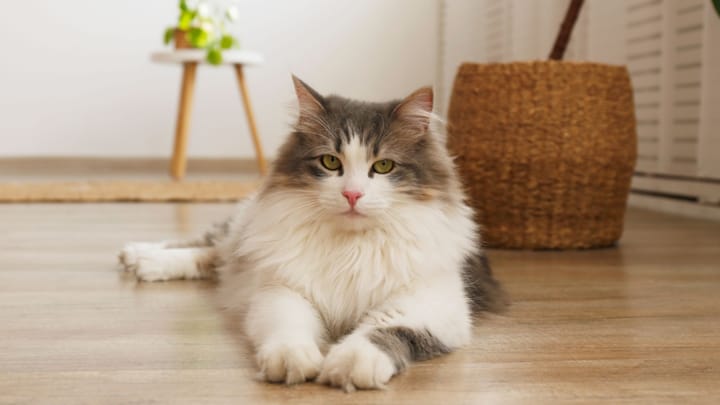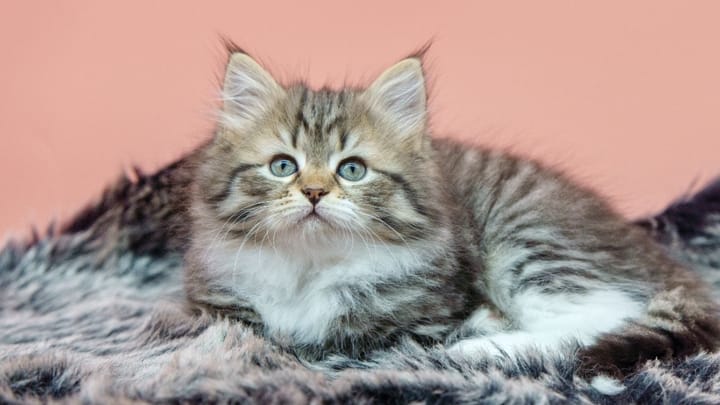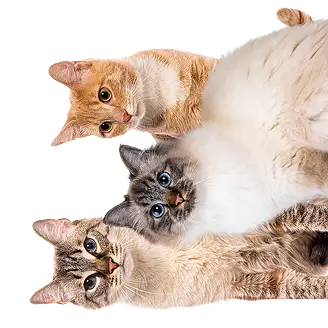Siberian cat
Other name: Siberian Forest cat


This large Russian breed adapted to the harsh climates of southern Siberia, hence their name. They are very rounded cats, and their fur is much thicker in winter than in summer. If you love large cats with mid-length hair, this is the breed for you!
|
Life expectancy |
The Siberian cat has a life expectancy of between 15 and 20 years |
|
Temperament |
|
|
Adult size |
Female
Approximately 12 in
Male
Between 12 and 14 in
|
|
Adult weight |
Female
Between 9 and 13 lb
Male
Between 11 and 18 lb
|
|
Coat colour
Black, white, red, as well as shades of grey/blue/cream etc Some colours, such as chocolate, cinnamon, lilac and fawn are not permitted. |
Black Brown White Red Cream Blue |
|
Type of coat
Mid-length |
Long |
|
Eye colour
Blue, aquamarine, yellow, dichroic, odd |
Blue
Yellow
Odd-eyed
|
|
Purchase price |
The Siberian cat costs between £150 and £650 |
Siberians are described as hypoallergenic, as they don’t produce much of the FELD1 protein, whose amino acid sequence causes allergies.
More details about the Siberian cat
Siberian cat: Origins and history
Siberians (native to southern Siberia), are most likely descended from cross breeding between wild cats and domestic cats in the region. It wasn’t until the late eighties that a couple of breeders imported the first Siberians from Saint Petersburg to start breeding them in Germany. In 1990, the first Siberians arrived in the United States where they were recognised by TICA as a breed 8 years later.
Physical characteristics of the Siberian cat
Siberians are large cats with muscular physiques and dense skeletons which make them rather heavy! People often affectionately refer to them as barrel-shaped. They have thick mid-length hair and a thick undercoat, and are crowned with beautiful collars of hair around their heads, which are particularly noticeable in winter.
Siberian cat: Characteristics
Siberian cat: Behaviour
Breed compatibility Siberian cat
Siberian cat: Purchase price
On average, Siberians cost between £150 and £650. This price varies depending on their lineage, breeding, age and sex. On average it costs £35 per month to keep them in good health, meet their needs, and ensure they get high quality food.
Siberian cat: Shedding
Heavy !
During their spring moult, these cats lose a lot of their thick protective winter fur which they don’t need during milder seasons.
Siberian cat: Grooming
Weekly brushing is sufficient, except during their spring moulting, when daily brushing may be necessary.
Siberian cat: Health
They have a life expectancy of between 15 and 20 years.
Their fur and undercoat give them excellent protection against both rain and cold weather. They also have a reputation for being generally healthy cats. However, they don’t particularly appreciate hot weather, even if their coat does adapt accordingly.
Their body type is already rounded at the ribs and it is important to avoid attributing these natural curves to weight gain! Therefore you must ensure that their diet is well adapted to their lifestyle to avoid them becoming overweight. Particularly as it isn’t easy to notice their weight gain due to their thick hair.
Siberians can develop the same diseases as other cats, such as oral diseases.
Other diseases that may appear include:
- Hypertrophic cardiomyopathy: it is a condition which causes the heart muscle to thicken. This disease can cause heart failure that can result in arrhythmias or even lung aedemas. You can screen for this with an echocardiograph repeated annually.
- Pyruvate kinase deficiency is a hereditary condition that causes anemia. If the cat is affected, their life expectancy can be shortened to a year, or they can stay alive for up to 10 years. A DNA screening test can be carried out to find out if the cat is carrying one or two alleles that cause the disease.
On average, they have 4 kittens per litter.
Cross breeding is banned.








